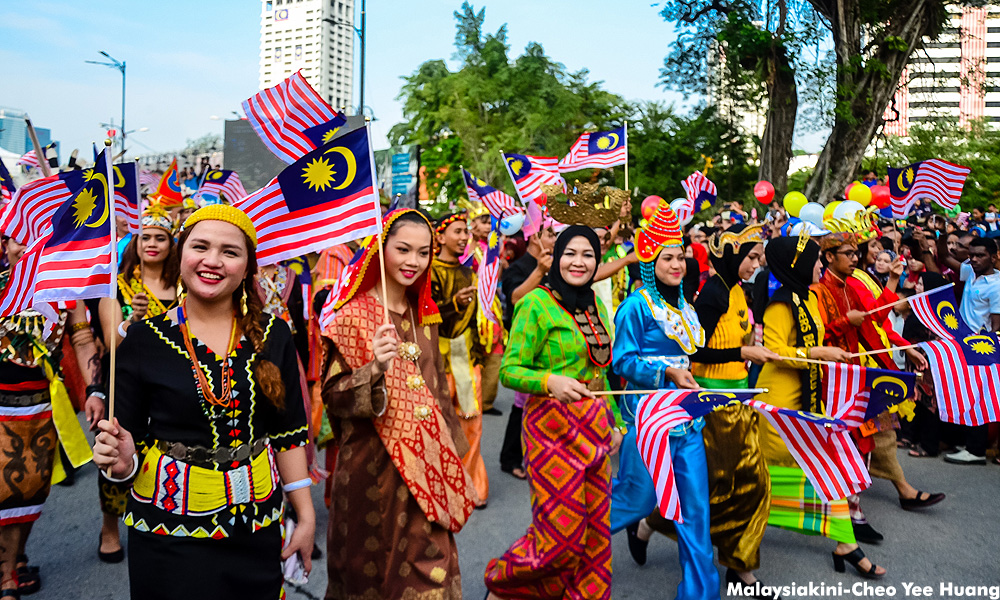
As the global North grapples with an identity crisis amidst a refugee imbroglio and a heightened fear of radicalism, the narrative that Malaysia should be grateful for our peaceful landscape has only been reaffirmed.
However, one only needs to look closer to see that ethno-religious fragmentation has come in vogue once again, with Mahathir’s rebranding of Umno’s bumiputera-ism and PAS’ exit from Pakatan to become a third force.
In response, the government has repeatedly identified national unity as a key component of the country’s long-term strategic agenda. Speaking on TN50 last month, Khairy Jamaluddin mentioned that the youth must have shared experiences for the interest of social cohesion, and that a compulsory national service programmes for school students is among the proposals on the table.
He is only partially correct. While it is indeed true that a united community requires some semblance of similarity, the mechanism of compulsion and forced narratives used in government campaigns will never be able to succeed in creating a society beyond quasi-connected silos.
Insofar as this slogan-crusade mentality continues, national unity programmes will continue to fail in deconstructing the divide-and-rule system that still dictates our everyday interactions.
To understand the discourse surrounding the issue, we first need to recognise that there are competing frameworks of unity at play.
Malaysia has historically adopted the pluralist model, or better known as the salad-bowl - various identities co-exist without having to sacrifice their distinctiveness.
As opposed to a melting pot model, where cultures converge to form a set of common values and traits, the pluralist model provided a quicker path to an acceptable social contract when independence was negotiated.
Unfortunately, it was also deeply short-sighted.
As our national unity programmes have tried to form a sense of ‘Malaysianness’ in an attempt to manufacture an overarching identity, it runs into irreconcilable differences between communities caused by the societal arrangements of the pluralist model.
The recent CIMB-sponsored study on ethno-religious relations revealed that campaigns such as Najib’s 1Malaysia was perceived differently across racial groups – non-Malays may respond to integration efforts by developing more positive outgroup attitudes, while Malays, for whom being Malaysian is associated with being Malay, will be unchanged.
Therein lies the issue – the pluralist model allowed for ethnic and religious communities to retreat and exist within enclaves that have been either carved out by history or by present-day government policies.
The seemingly harmonious Malaysian social makeup is solely maintained by this form of appeasement – communities are satisfied living in their silos. Just as how Chinese schools have proliferated, Islamic schools have also grown exponentially since 1957.
The pitfall of pluralism is the consequential polarisation where exclusivity is responded to by even more exclusivity. It permeates in racial and religious preferences in employment, house rentals and the people we choose to marry.
Shared experiences, flag-waving and success in sporting events will continue to fail to reconcile deeply-seeded conflicts between communities that foster aforementioned preferences – unity programmes already posit a fixed picture of what Malaysia should look like from the get go, which simply doesn’t engage and attract communities with different and contradictory ideals. Even a picture of a national athlete was met with demands for her to be tudung-clad.
Here lies the question – what is required of Malaysia to move towards the melting pot model? What are the methods necessary to enfranchise far-flung communities and foster understanding of each other's’ grievances? How do we get people out of their ethno-religious silos?
Fundamentally, social convergence happens on the most microscopic level of interactions – friendships. The CIMB study showed that having more friends outside your religious grouping can moderate the negative attitudes towards religious outgroups.
Sociologists since the 1950s have considered three conditions crucial to making close friends: proximity; repeated, unplanned interactions; and a setting that encourages people to let their guard down and confide in each other.
All three of these conditions point to the unsurprising fact that the normality of our daily lives ultimately determine our friends and therefore shape our prejudices. No amount of happy-go-lucky events or programmes organised by governments can outweigh the overwhelming influence of the people that live around us.
As such, Malaysia needs some serious introspection when it's blowing off large amounts of taxpayer money on initiatives that don't work. To truly connect communities to one another, we need to look at the areas that really matter – it is our marriages, our neighbourhoods, our schools and our workplaces. In all these places, both public and private actors are guilty of defending the comfortable ingroups we live in.
To move forward, it isn't only the government that needs to remove restrictive policies that prevent communities from co-living. The onus is on the individual to remove oneself from silos and consider the legitimate realities of the most extreme counterpart. Only then will we get the melting pot Malaysia needs.
JASON WEE is a research intern at the Institute for Democratic and Economic Affairs (Ideas) and an undergraduate student at the Woodrow Wilson School of Public and International Affairs, Princeton University. - Mkini



No comments:
Post a Comment
Note: Only a member of this blog may post a comment.